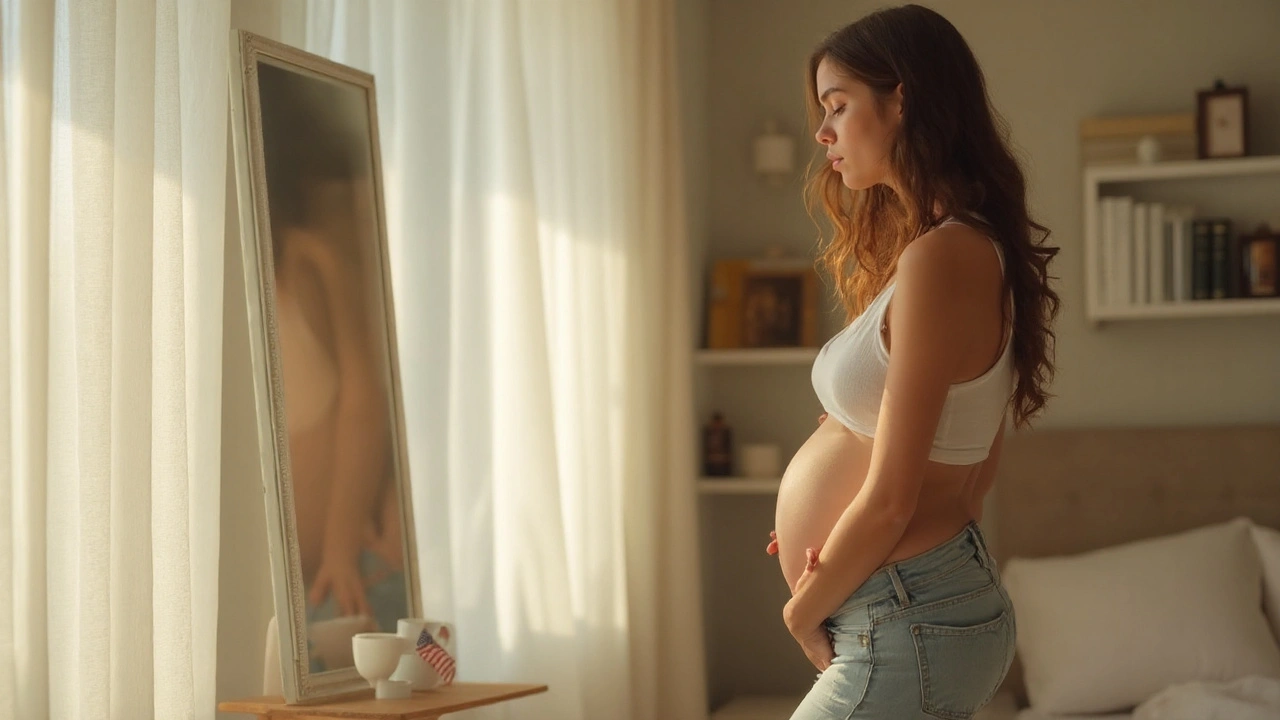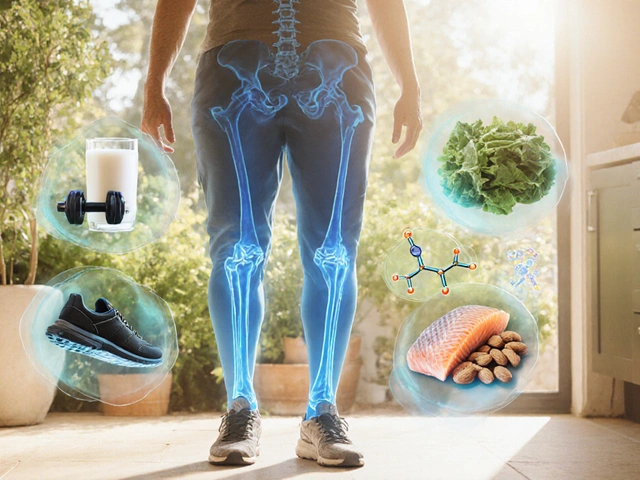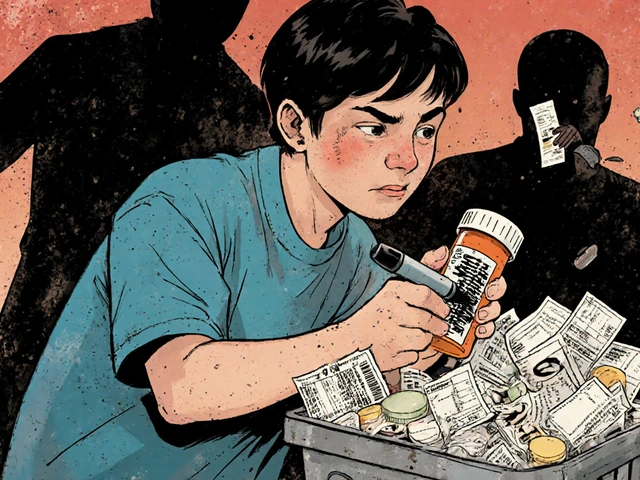Abdominal distension is a visible or palpable swelling of the belly caused by excess gas, fluid, or tissue. It often accompanies conditions such as irritable bowel syndrome, ascites, or simple overeating, and can range from fleeting bloating to persistent enlargement. While the physical sensation varies, the emotional fallout tends to follow a predictable pattern: people start judging their appearance, compare themselves to an ideal, and feel a dip in body image. That shift reverberates straight into self‑esteem, shaping confidence in social, professional, and intimate settings.
Quick Takeaways
- Abdominal distension can trigger negative body‑image thoughts within hours of an episode.
- Reduced self‑esteem often stems from social stigma and internalized beauty standards.
- Managing gut health, coping strategies, and supportive environments restore confidence faster than medication alone.
The Anatomy of Perception: How Distension Alters Body Image
When the midsection swells, clothing fits differently, mirrors reflect a broader silhouette, and the brain registers a mismatch between "expected" and "actual" shape. This visual cue activates the psychological impact pathway: the visual cortex sends signals to the prefrontal cortex, which then consults stored cultural norms about a "flat stomach". If the visual data clashes, cognitive dissonance spikes.
Studies from the Journal of Psychosomatic Research (2023) measured a 27% rise in negative body‑image scores within 48hours of a bloating episode among participants with functional gastrointestinal disorders. The effect was strongest in women aged 25‑40, a group heavily exposed to media ideals of "toned" midriffs.
Key attributes of this perceptual shift include:
- Heightened awareness of abdominal contour.
- Comparison to personal or societal standards.
- Emotional labeling ("I look fat", "I’m unattractive").
Each step reinforces the next, creating a feedback loop that can solidify a negative self‑concept.
Self‑Esteem: From the Surface to the Core
Self‑esteem is the overall evaluative attitude toward oneself. While it draws from many sources-career success, relationships, personal achievements-physical appearance remains a powerful driver, especially in cultures where thinness is equated with discipline.
When abdominal distension repeatedly intrudes, the mind often generalizes: "My body is out of control; therefore, I’m not in control of my life." This cognitive drift can lower the Rosenberg Self‑Esteem Scale by an average of 3.2 points during flare‑ups, according to a 2022 meta‑analysis spanning 12,000 participants.
Beyond numbers, real‑world consequences emerge:
- Social avoidance: Skipping gatherings to dodge tight clothing.
- Professional hesitation: Declining networking events for fear of judgment.
- Intimacy strain: Feeling embarrassed during close physical contact.
These behaviors can cement a lower baseline of self‑worth even when the belly later flattens.
Key Related Entities and Their Roles
The ripple effect of abdominal distension touches several interconnected entities:
- Gut health: The underlying physiological state that dictates gas production, motility, and fluid balance.
- Bloating: A short‑term, often post‑meal swelling that can trigger immediate self‑critique.
- Anxiety: Heightens awareness of bodily sensations and can worsen perceived distension.
- Depression: Chronic negative self‑image feeds depressive thought cycles.
- Social stigma: The external pressure that reinforces internal shame.
- Weight perception: How individuals interpret their body mass, often skewed by abdominal swelling.
- Clothing fit: Practical indicator that signals body‑image changes to the wearer.

Temporary Bloating vs. Chronic Abdominal Distension
| Attribute | Bloating (Temporary) | Chronic Abdominal Distension |
|---|---|---|
| Typical Duration | Minutes to hours | Weeks to months |
| Common Causes | High‑FODMAP foods, carbonated drinks | IBS, ascites, hormonal shifts |
| Impact on Body Image | Brief self‑consciousness | Persistent negative perception |
| Management Strategies | Dietary tweaks, water, movement | Medical evaluation, gut‑health plan, counseling |
| Psychological Toll | Low to moderate | High; often linked with anxiety/depression |
Practical Steps to Reclaim Positive Body Image
Addressing the issue requires a two‑pronged approach: physical mitigation and mental reframing.
1. Tame the gut first
- Track food intake for two weeks using a simple journal; identify patterns that precede swelling.
- Introduce a low‑FODMAP diet gradually-swap beans, onions, and wheat for alternatives like quinoa, zucchini, and lactose‑free dairy.
- Stay hydrated; aim for 2‑2.5L daily to promote motility.
- Consider probiotics with strains Lactobacillus rhamnosus GG or Bifidobacterium infantis, proven to reduce gas production in 60% of users (2022 clinical trial).
- Consult a gastroenterologist if swelling persists >3weeks; rule out underlying pathologies.
2. Shift the mental narrative
- Practice body‑neutral language. Replace "I look fat" with "My belly feels full right now; it doesn’t define me."
- Use mirror exposure exercises: spend 2minutes each morning looking at your whole body, focusing on qualities you like (eyes, posture, smile).
- Engage in confidence‑building activities unrelated to appearance: mastering a hobby, volunteering, or public speaking.
- Seek cognitive‑behavioral therapy (CBT) if negative thoughts dominate; CBT has a 45% success rate in improving self‑esteem among chronic GI patients (2021 study).
These steps create a feedback loop opposite the one described earlier: physical relief reduces visual triggers, which in turn eases the emotional response.
Connecting to the Larger Health Landscape
This article sits within the broader Health and Wellness cluster, which also covers nutrition, mental health, and chronic disease management. Narrower topics you might explore next include "Mindful Eating for IBS Relief" or "How Clothing Choices Influence Body Confidence". Conversely, the broader umbrella would include "Psychosocial Effects of Chronic Illness" and "Holistic Strategies for Mental Well‑Being".
When to Seek Professional Help
If you notice any of the following, schedule a medical appointment:
- Sudden, severe abdominal pain.
- Unexplained weight loss or gain accompanying distension.
- Persistent swelling despite dietary changes.
- Symptoms of anxiety or depression that interfere with daily life.
- Feelings of hopelessness about body image.
Early intervention can prevent the spiral from turning into a long‑term self‑esteem issue.

Frequently Asked Questions
Can occasional bloating really damage my self‑esteem?
Yes. Even brief episodes can trigger a cascade of negative thoughts, especially if you already have perfectionistic tendencies. The brain links the visual cue of a larger belly to internalized standards, and that can dent confidence until the swelling passes.
What’s the difference between normal gas and a sign of a serious condition?
Normal gas is usually intermittent, tied to meals, and resolves within a few hours. Persistent, progressive swelling, especially accompanied by pain, fever, or jaundice, may signal conditions like ascites, liver disease, or bowel obstruction and warrants medical evaluation.
How can I dress to feel better during a bloating episode?
Opt for stretchy fabrics, high‑waisted leggings, or wrap‑style tops that accommodate expansion without digging in. Darker colors on the midsection can also reduce visual focus on swelling.
Is therapy worth it if my main issue is the belly’s appearance?
Absolutely. Therapy targets the thought patterns that link appearance to self‑worth. Even when the physical issue improves, the mental frameworks often persist; CBT or acceptance‑based therapies help restructure those beliefs.
Do probiotics actually reduce abdominal distension?
Research shows that specific strains-especially L. rhamnosus GG and B. infantis-can lower gas production by up to 30% in people with functional GI disorders. Effects vary, so a trial period of 4‑6 weeks is recommended.







Bradley Fenton
September 24, 2025 AT 22:07Totally get how bloating can throw you off your groove. Small tweaks in diet often make a big difference.
Wayne Corlis
September 28, 2025 AT 23:20Ah, the human preoccupation with a protruding belly, how utterly riveting.
We spend endless hours calculating calories, yet the universe laughs.
Your gut decides to expand when you least expect, a reminder of mortality.
Society then hands you a mirror and whispers, “Fix it, you thin‑ideal champion.”
The gut‑brain axis becomes a courtroom where your self‑esteem is on trial.
Every clench of a bloated abdomen feels like a verdict of failure.
Yet the scientific data tells us gas is natural, not a moral failing.
Still, we internalize the shame like a stubborn stain on our confidence.
The irony is that the very foods we love most often trigger the distress.
So we oscillate between restriction and indulgence, a tragic carousel.
Meanwhile, friends notice the mood shifts and attribute them to vanity.
In reality, the physiological cascade is merely a hiccup of digestion.
But cultural narratives magnify it into a personal apocalypse.
One could argue that reframing the narrative might deflate the drama.
Until then, we’ll keep juggling diet hacks and self‑talk like acrobats on a tightrope.
Kartikeya Prasad
October 3, 2025 AT 00:34Hey buddy, think of your belly like a mischievous balloon that just wants a bit of attention 😉. Swap out those bean‑heavy meals for vibrant zucchini ribbons and watch the puffiness retreat like a shy magician.
HARI PRASATH PRASATH
October 7, 2025 AT 01:47Listen, teh bloat isn’t just a cute fluffer it’s a real distention that can mess wit your confidence. You gotta tackle it head on, no more ignoreing the signs.
Andrew Miller
October 11, 2025 AT 03:00I feel the weight of each swell like a silent echo in a crowded room.
Brent Herr
October 15, 2025 AT 04:14Enough with the excuses – you’re letting a temporary puff dictate your self‑worth, and that’s a disgrace to anyone who values personal responsibility.
Julius Adebowale
October 19, 2025 AT 05:27Gas is normal it’s not a crime to feel insecure about it
KISHORE KANKIPATI
October 23, 2025 AT 06:40Imagine your stomach as a canvas; occasional splashes of fog are just part of the artistic process, not a flaw needing harsh criticism.
Jefferson Vine
October 27, 2025 AT 06:54Whoa, the drama of a bloated belly can feel like the climax of a tragic opera, but remember, every act ends and the curtain falls.
Ben Wyatt
October 31, 2025 AT 08:07Hey there, you’ve already taken the first step by recognizing the issue, and that’s a huge win; keep exploring the gut‑friendly tips and your confidence will bounce back.
Donna Oberg
November 4, 2025 AT 09:20Oh dear! The abyss of abdominal inflation looms large-yet, dear reader, do not despair, for within the chaos lies a beacon of hope!; embrace the journey, cherish each tiny victory, and let your spirit soar above the swell!.
Garreth Collard
November 8, 2025 AT 10:34Look, a little extra air isn’t the end of the world; just adjust your wardrobe and give your gut some TLC, and you’ll feel back on track.
Daniel LaMontagne
November 12, 2025 AT 11:47Totally get the struggle 😅. Try a gentle walk after meals 🚶♂️ and sip warm water 🍵 – small habits can make a big shift.
Gary Levy
November 16, 2025 AT 13:00It’s easy to get caught up in the visual alarm bells, but remember that many of those feelings are fleeting. Consistency with low‑FODMAP foods and mindful breathing can calm both the gut and the mind. Keep at it, and the confidence will follow.
sourabh kumar
November 20, 2025 AT 14:14Bloated belly is just a signal hear your gut speaking ignore the noise
Christian Miller
November 24, 2025 AT 15:27One must consider the possibility that mainstream dietary guidelines are engineered to perpetuate a cycle of discomfort, thereby ensuring a continuous market for pharmaceutical interventions.
NORMAND TRUDEL-HACHÉ
November 28, 2025 AT 16:40Honestly, if you’re not tracking every bite, you’re basically signing up for surprise bloat – just sayin’.
AJIT SHARMA
December 2, 2025 AT 17:54The swollen gut is a loud shout in a silent room, demanding respect.
Neber Laura
December 6, 2025 AT 19:07Listen up, you deserve to feel good in your skin, so stop letting a little gas run the show.
Karen Nirupa
December 10, 2025 AT 20:20Dear community, it is with great enthusiasm that I encourage you all to adopt a compassionate stance toward bodily variations, recognizing that self‑esteem flourishes when we honor our inherent worth.